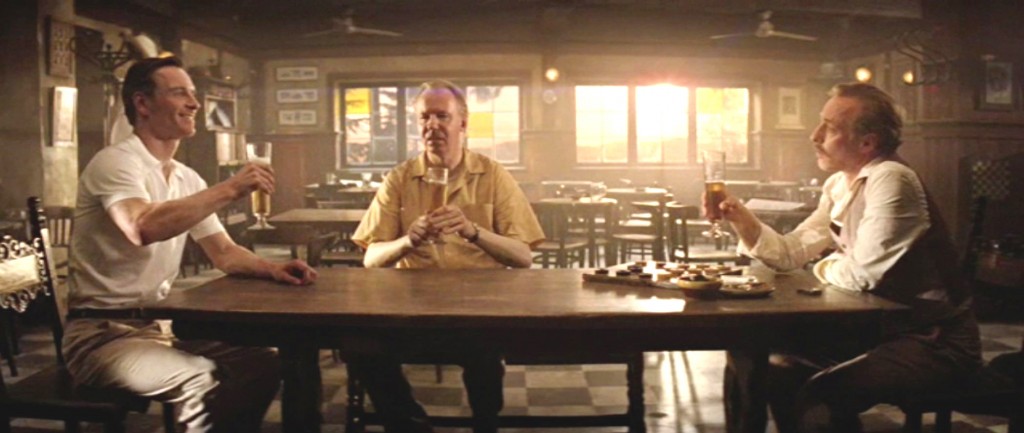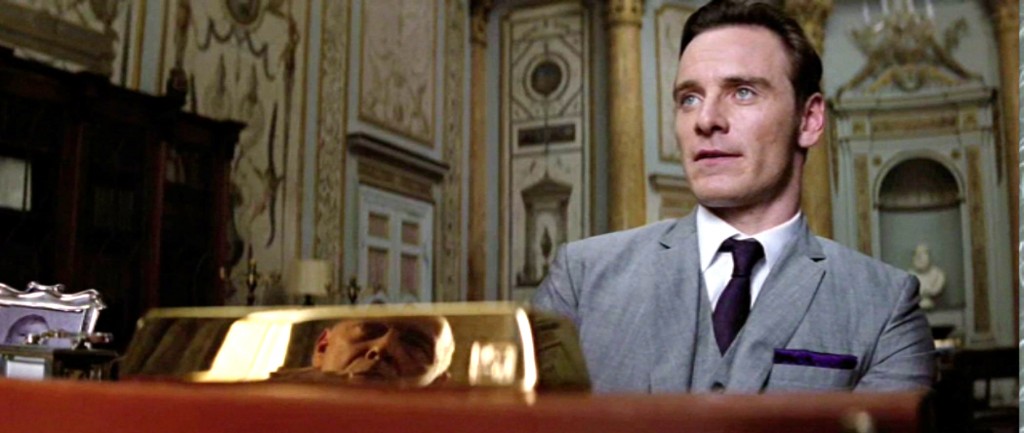X-Men: First Class part 4
Moira MacTaggert, temporarily a protagonist and looking for an expert on mutants, travels to Oxford to find Xavier, who has just received his degree. Meanwhile, Erik travels to Argentina to Find Dr. Schmidt, who he doesn’t yet know is really Sebastian Shaw. He comes to a bar that serves German beer and finds a couple of regular patrons who, as luck would have it, are pictured in a photograph up on the wall, with Schmidt, on a boat (a boat with anachronistic Trajan font on its stern). The tables have turned, Nazis are the Other now and these two pals of Schmidt are hiding in South America. Erik reveals himself and kills the two men and the German bartender. One of the men tries to defend himself with a Nazi knife (“Blood and Honor” it says on its blade) while the bartender approaches with a Luger, the Nazi pistol of choice. Even though Erik went in to get information about Schmidt, he got none from the men himself — he learned everything he needs to know from the boat photo with the anachronistic font. He kills two of the men in self-defense and one out of vengeance. Or, since he has control over all the metal objects in the room, he kills them all out of vengeance. The one with the knife gives the old Nazi excuse of “We were only following orders,” an expression that was hugely popular among escaped Nazis at the time: Adolf Eichmann had just been captured in Argentina and was tried in Jerusalem in the spring of 1962 and used the “only following orders” defense as his excuse. Eichmann had just been executed at the time this scene takes place, the knife-wielder’s use of the quote could not have been more germane, or more ill-timed to garner sympathy from Erik.
X-Men: First Class part 3
The grown-up Erik Lehnsherr has traveled to Switzerland, like Jason Bourne, to find something. Bourne was looking for himself, but Erik is looking for Dr. Schmidt, the Nazi doctor who wasn’t really a Nazi doctor, who mentored him and developed his metal-manipulation powers during WWII.
Erik has gotten into the bank by pretending to be a client with a bar of Nazi gold. The screenplay doesn’t indicate where he got this bar of gold, but he does mention that “it’s all that’s left of my people.” Did Erik, under orders from Schmidt, extract this gold from the teeth of Jews in Schmidt’s prison camp, remove jewelry hidden on their persons? He doesn’t say, but we shortly see him do both those things to the Swiss banker who resists giving up Schmidt’s current location. Erik says he’d like to kill the banker, since the banker apparently has plenty of ex-Nazi clients, but he stops at merely removing one of his fillings. We will see later that Erik has no trouble killing Nazis, why does he demur at the opportunity to kill the banker? Perhaps he’s worried the murder of a banker would draw undue attention to him. In any case, the banker gives Erik Schmidt’s current location (Argentina, the ex-Nazi’s favorite hiding place).




